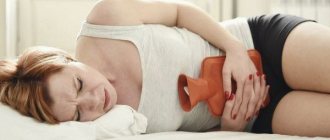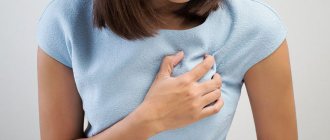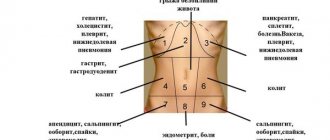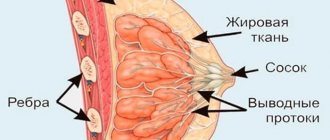The stomach hurts, but menstruation does not begin, because there may be a delay, inflammatory diseases of the genital organs, temporary hormonal changes. To identify the exact cause, an examination is carried out, an anamnesis is collected, and an examination is performed.
How long have you had this pain syndrome?
- Several days (26%, 1,057)
- First day (21%, 865 Votes)
- Several months (13%, 514)
- Week (10%, 414)
- Several weeks (9%, 384)
- About a month (8%, 344)
- Chronic form (6%, 256)
- About a year (6%, 227)
Total voters: 4 062
Loading …
Consult a doctor!
The site provides reference information . Adequate diagnosis and treatment of the disease is possible under the supervision of a conscientious doctor . Any medications have contraindications. Consultation with a specialist and detailed study of the instructions is necessary! Be sure to make an appointment with your doctor .
Excessive fatigue and weakness
Unmotivated weakness that appears about a week after the expected moment of conception can also become a sure sign of your pregnancy. This happens because your body begins to produce progesterone, a hormone that allows you to maintain pregnancy. And fatigue is a side effect of hormonal changes.
True, fatigue does not always only indicate pregnancy. It can appear due to a number of diseases, as well as before menstruation.
Anovulatory cycle
A healthy woman under 30 years of age may have about 2 cycles a year when there is no ovulation. After 35 years, there are 5–6 such cycles per year.
Then the balance of estrogen and progesterone is disrupted. There is a delay of about 1 week in menstruation, and the pain syndrome intensifies.
There is nothing dangerous or supernatural about this. For women who keep a basal temperature chart, everything is very clear.
In the absence of ovulation, the cycle lengthens somewhat. The pain may be present all week.
Periodically it worsens and then disappears.
Dizziness
This symptom does not appear in all women, but in many (two weeks after conception). It is caused by the fact that in the first weeks after conception, the uterus requires much more blood supply in order for the egg to implant successfully. In such conditions, blood pressure may drop sharply and dizziness may occur.
True, this symptom has many other causes, including very dangerous ones. Therefore, it can only indicate pregnancy in combination with other signs.
Why does my stomach hurt but my period doesn't start?
1-2 days before the start of menstruation, abdominal pain begins. This is a normal condition caused by spasm of the muscle tissue of the uterus, endothelium of microcirculation vessels. There are times when pain appears, but bleeding does not occur.
There are the following physiological reasons for this:
- pregnancy that the woman does not know about;
- disruption of the amount of hormones that affect the menstrual cycle (for example, with severe stress, psycho-emotional stress, excessive physical activity);
- lack of drinking regime, leading to dehydration and a decrease in the amount of blood plasma;
- gradual onset of menopause with the absence of monthly release of eggs;
- adolescence.
In case of deviations, it is enough to eliminate the damaging factors, the body will recover on its own, and the lower abdominal region will stop hurting.
If this does not happen, diseases will form:
- inflammation of the reproductive system (uterus, ovaries, fallopian tubes, vagina);
- pathology of the abdominal organs (digestive tract, liver, kidneys, pancreas);
- malignant or benign tumors, cysts, abscesses, other neoplasms;
- an infection spreading through the lower part of the vagina, gradually moving deep into the genital organs (papillomavirus, gonorrhea, chlamydia, ureaplasmosis, candidiasis);
- endocrine dysfunction.
Diseases are identified based on emerging symptoms, collecting patient complaints, general examination of the female body, and conducting research.
A woman complains to the doctor about changes in her health, increased body temperature, and increased pain. This reduces the quality of life and causes the risk of complications.
Appendicitis
One of the most common disorders of the digestive tract and one of the most dangerous. The main threat of appendicitis is the unpredictability of the problem and the risk of inevitable aggravating consequences (peritonitis, blood poisoning, deadly abscesses).
According to statistics, the likelihood of exacerbation of appendicitis is quite high and increases in people with a tendency to constipation, overeating, insufficient fiber intake, multiple infectious lesions (indirectly - weakened immunity). The hereditary factor plays an important role. Pregnant women are also at increased risk due to compression of the organ by the uterus.
In the catarrhal stage of appendicitis, the pain affects only the right lower abdomen, which may coincide with the expected day of the onset of menstruation and cause a slight delay. However, the duration of this condition is short (does not exceed 12 hours), and then it passes into the stage of acute inflammation. In the vast majority of such cases, doctors are forced to resort to an emergency surgical solution to the problem - laparoscopic appendectomy. Therefore, a delay of 1 day, pulling in the lower abdomen and a headache are some of the signs of appendicitis.
When is pain before menstruation normal?
Most often, minor pain in the lower abdomen before directly depends on the amount of endorphins. These hormones are produced by neurons in the brain and are responsible for pain. They are popularly known as “happiness hormones”.
The secretion of endorphin is “subject to” progesterone and estrogen, the level of which is variable. A week before menstruation, progesterone is at its peak, although estrogen decreases slightly. A sharp drop in both hormones the day before leads to a similar drop in endorphin levels. Hormonal changes cannot go unnoticed, since they occur at the level of the central nervous system.
Pain in the lower abdomen can be the cause of premenstrual syndrome if it is characterized by a number of other symptoms such as: an unbearable desire to hide from others and cry; resentment towards everyone, which results in aggression; weakness and headaches; pain in the heart and shortness of breath; excessive appetite;
In most cases, the condition does not require treatment, but if depression goes too far and affects the quality of family life, then you should consult a doctor.
Causes of bloating before menstruation
To combat unpleasant symptoms of PMS, you need to know the reasons for their occurrence. They are divided into a number of categories.
Hormonal reasons
The menstrual cycle of women is a complex process, accompanied by monthly hormonal changes in the body during the childbearing period. The changes are associated with the level of three hormones: prolactin, progesterone, estrogen. The level of estrogen increases at the time of ovulation, gradually decreasing, with progesterone the opposite: the maximum amount occurs at the beginning of bleeding. Premenstrual syndrome causes a decrease in estrogen levels while increasing progesterone.
- Endometrial growth. The female hormone responsible for preparing the body for conception and bearing a child is called progesterone. It stimulates the growth of the endometrium (the mucous membrane inside the uterus), which has a porous structure consisting of many blood vessels. The substances necessary for development are supplied to the embryo through the vessels. This is how the body prepares for conception. The uterus swells, affecting the intestines, and the size of the abdominal muscles increases. If pregnancy does not occur, the reverse process begins. The membrane peels off, leaves the body with blood during menstruation, compression of neighboring organs goes away, and the size of the uterus returns to normal.
- Swelling. These same hormones force the female body to accumulate excess water in the abdominal tissues, arms, legs, and face. During blood loss, this helps to avoid dehydration and, when processed, the fluid enters the blood.
- Ovulation. Often the belly begins to swell during ovulation. A strong hormonal surge occurs, to which the body reacts with pain, bloating, and flatulence.
Intestinal peristalsis
In the period after ovulation before spotting, blood flow to the uterus and ovaries increases. They begin to swell, squeezing the intestinal walls, causing spasms. Food moves unevenly, forming air barriers. The woman's stomach growls, swells, severe gas formation begins, and stool upset. After menstruation everything returns to normal.
Pregnancy
Perhaps pregnancy has occurred. In the first weeks it is difficult to determine. Due to the hormone progesterone, a change occurs in the body that prepares the female organs for bearing and giving birth to a child. The stomach inflates, the chest swells, and body weight increases. It is possible to independently determine pregnancy in the early stages by a hard lump in the lower abdomen. If conception does not take place, the belly remains loose and soft. A delay of a couple of weeks indicates the need to purchase a pregnancy test at the pharmacy. If the result is positive, you should contact a gynecologist.
Pathological processes
A slight swelling in the waist area does not interfere with everyday life, but if the stomach is very swollen before menstruation, constantly rumbles, and hurts, this indicates hidden human illnesses:
- inflammation of the ovaries, uterus;
- adhesions in the pelvic organs;
- chronic oophoritis;
- ovarian cyst;
- neoplasm: uterine fibroids. This benign tumor can develop into malignant. The presence of fibroids is characterized by a rounded tummy, as during pregnancy, then severe pain appears, and menstruation may stop. If you have fibroids, you should be under constant supervision of a gynecologist and undergo an examination once a year.
Binge eating
Thanks to the hormone progesterone, which acts on the nervous system, almost all women begin to feel hungry a week before their period. They eat a lot, become nervous and irritable.
To cheer up, you want to experience joy, have fun. The easiest way to get rid of depression is to eat delicious food. And everything tasty, as a rule, high-calorie or salty, leads to fluid retention and the appearance of a round belly.
PMS and the associated hormonal imbalance negatively affect a woman's will. If usually many limit themselves in food and refuse sweets, then here women give in.
Large volumes of food at this time are poorly digested, food masses stagnate in the intestines. The result is flatulence and bloating.
What to do if you have bloating?
What to do to overcome this unpleasant phenomenon? You can’t get rid of it completely, but you can reduce the size and period of bloating. To do this, you need to follow a healthy lifestyle and doctors' recommendations.
Playing sports
Constantly engage in available sports: water aerobics, swimming, dancing, exercise equipment, running. During menstruation, heavy exertion is not recommended; it is better to walk long distances. While walking, gases are removed from the intestines and gastrointestinal tract much faster. Lie down only if you feel unwell. Pump up your abs, do exercises to strengthen your back muscles.
Proper nutrition
Proper nutrition is one of the main ways to combat bloating. Before menstruation, it is advisable to reduce food portions and increase the number of meals. Limit or completely avoid junk food and products that cause flatulence.
- Eat less salt. During PMS, as during pregnancy, you crave salty foods. Sodium retains water in the body, increases the load on the heart and hematopoietic system, and increases swelling.
- Limit your sugar intake. All sweets in the body are processed into glucose, which retains sodium in the body.
- Drink water. It improves digestion, helps fight constipation, and removes toxins from the body.
- Avoid tea, coffee, alcohol and carbonated drinks. They contribute to bloating.
- Drink herbal teas from mint and decoctions of chamomile, lingonberries, and cranberries. They reduce pain and remove excess fluid from the body.
- Eat foods rich in fiber. They help fight constipation.
- Keep it in moderation. When consuming large amounts, gas formation and bloating begin. A lot of fiber is found in cabbage, bran, beans, beans, and mushrooms.
- Temporarily exclude dairy products from your diet, which increase the manifestations of flatulence many times over.
- Take a complex preparation containing B vitamins, potassium, magnesium. They are responsible for digestion, strengthening blood vessels and calming the nerves.
Warm baths
Before your period starts, take warm, soothing baths. You can add sea salt, a few drops of fennel or black pepper essential oil, and a decoction of valerian, pine needles, mint, and sage herbs to the water. Baths help you relax, promote healthy sleep, and strengthen the nervous system.
Sex
Sex is good for the body. To improve your well-being and mood, doctors recommend having sex before your period. It helps blood circulation in the pelvic area and has a beneficial effect on the female body.
Cloth
If your belly enlarges for natural reasons, you should not try to tighten it with a corset or shapewear. Strong compression causes severe pain due to impaired blood supply, increased swelling, intestinal spasms, and flatulence. It is better not to tighten your stomach, but to wear loose clothes.
Medicines
If the abdominal volume increases, take medications depending on the cause of the bloating:
- If the main symptom is tension, pain, spasms of the intestines and uterus, then antispasmodics help well: 1-2 tablets of No-shpa, Spasmalgon, Drotaverine.
- If your stomach is very swollen, use carminatives: Disflatil, Espumisan, Antareit.
- If you experience flatulence, bowel dysfunction, nausea, use enterosorbents: Smecta, Polyphepan, Activated carbon.
The medication should not be abused. It is better to consult a gynecologist.
Bloating occurs in 75% of women. This is a normal reaction of the body to hormonal changes during premenstrual syndrome and menstruation. If the symptoms of PMS do not go away, contact a specialist and conduct a comprehensive examination. After treatment of concomitant diseases, if preventive rules are followed, a slight increase in the waist will be noticeable only a couple of days at the beginning of menstruation.
Every woman is familiar with periodic pain in the lower abdomen. Appear before menstruation or during menstruation. Women often complain that their stomach hurts in the middle of their cycle. Nagging pain occurs for a number of reasons, the main one being the onset of ovulation.
Ovulation occurs every month. At this moment, the egg is released from the ovary. The period of egg maturation is considered a favorable moment for conceiving a child. A regular menstrual cycle depends on the timing and presence of ovulation.
Statistics show that most of the fair sex do not know when the egg is released. For a healthy woman, this is usually the middle of the cycle. During this period, basal body temperature rises. Minor pain in the lower abdomen and swelling of the mammary glands appear. To clarify the onset of ovulation, it is recommended to do a special test (sold at the pharmacy).
Treatment: how to remove spasms
If you are absolutely sure that pain in the lower abdomen is physiological in nature, or doctors have made such a conclusion based on tests and studies, you need to take measures to reduce pain in the lower abdomen. To do this you need to follow certain rules:
- establish a daily routine;
- develop, preferably with an experienced trainer, optimal loads;
- limit mental and physical activity on the eve of menstruation;
- avoid stress;
- carefully approach various types of diets, avoid diets that deplete the body;
- give yourself enough rest;
- take a course of multivitamins and minerals;
- avoid hypothermia;
- visit a gynecologist at least once every six months.
Some techniques will help relieve pain:
- lie on your side, pull your knees bent to your chest;
- apply a slightly warm heating pad;
- drink a herbal solution made from a mixture of linden blossom, St. John's wort and chamomile.
You don't have to put up with a painful period. It is better to get examined by a gynecologist. The doctor will conduct an examination and may additionally prescribe an ultrasound, blood tests, hormonal studies, and vaginal smears.
To treat secondary algodismenorrhea, it is necessary to find the underlying cause and eliminate it. Most often these are inflammatory diseases, so antihistamines, antibiotics, and vitamins are prescribed.










